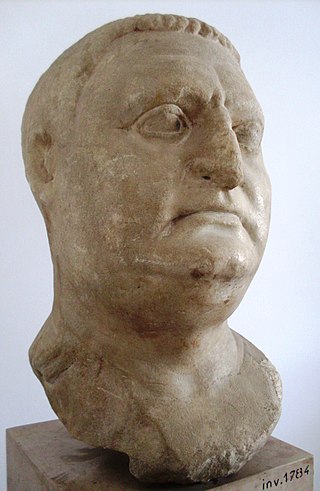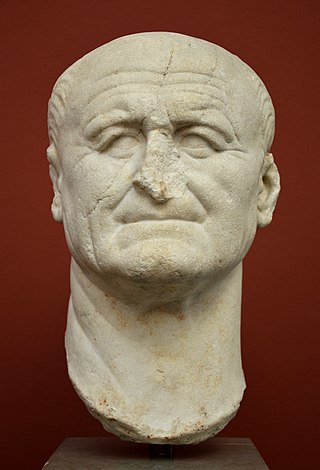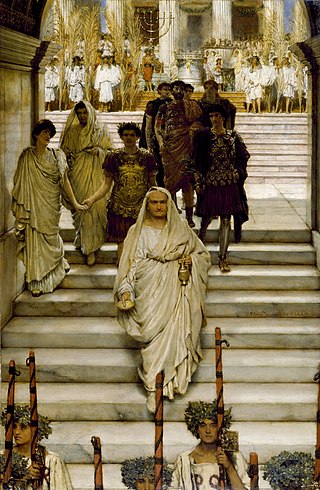Related Research Articles

Galba was Roman emperor, ruling for 7 months from 8 June AD 68 to 15 January 69. He was the first emperor in the Year of the Four Emperors and assumed the throne following Emperor Nero's suicide.

Aulus Vitellius was Roman emperor for eight months, from 19 April to 20 December AD 69. Vitellius became emperor following the quick succession of the previous emperors Galba and Otho, in a year of civil war known as the Year of the Four Emperors. Vitellius added the honorific Germanicus to his name instead of Caesar upon his accession. Like his predecessor, Otho, Vitellius attempted to rally public support to his cause by honoring and imitating Nero who remained popular in the empire.

Vespasian was Roman emperor from 69 to 79. The last emperor to reign in the Year of the Four Emperors, he founded the Flavian dynasty, which ruled the Empire for 27 years. His fiscal reforms and consolidation of the empire brought political stability and a vast building program.

Titus Caesar Vespasianus was Roman emperor from 79 to 81. A member of the Flavian dynasty, Titus succeeded his father Vespasian upon his death, becoming the first Roman emperor to succeed his biological father.

Publius Clodius Thrasea Paetus, Roman senator, who lived in the 1st century AD. Notable for his principled opposition to the emperor Nero and his interest in Stoicism, he was the husband of Arria, who was the daughter of A. Caecina Paetus and the elder Arria, father-in-law of Helvidius Priscus, and a friend and relative by marriage of the poet Persius. Thrasea was the most prominent member of the political faction known today as the Stoic Opposition.

The Year of the Four Emperors, AD 69, was the first civil war of the Roman Empire, during which four emperors ruled in succession: Galba, Otho, Vitellius, and Vespasian. It is considered an important interval, marking the transition from the Julio-Claudians, the first imperial dynasty, to the Flavian dynasty. The period witnessed several rebellions and claimants, with shifting allegiances and widespread turmoil in Rome and the provinces.

The Flavian dynasty, lasting from AD 69 to 96, was the second dynastic line of emperors to rule the Roman Empire following the Julio-Claudians, encompassing the reigns of Vespasian and his two sons, Titus and Domitian. The Flavians rose to power during the civil war of AD 69, known as the Year of the Four Emperors; after Galba and Otho died in quick succession, Vitellius became emperor in mid 69. His claim to the throne was quickly challenged by legions stationed in the eastern provinces, who declared their commander Vespasian emperor in his place. The Second Battle of Bedriacum tilted the balance decisively in favor of the Flavian forces, who entered Rome on 20 December, and the following day, the Roman Senate officially declared Vespasian emperor, thus commencing the Flavian dynasty. Although the dynasty proved to be short-lived, several significant historic, economic and military events took place during their reign.
Aulus Caecina Alienus was a Roman general active during the Year of the Four Emperors.
Titus Flavius T. f. T. n. Sabinus was a Roman politician and soldier. A native of Reate, he was the elder son of Titus Flavius Sabinus and Vespasia Polla, and brother of the Emperor Vespasian.
Fannia was a woman of ancient Rome, notable as the granddaughter of Arria Major and daughter of Arria the Younger.
Cornelius Fuscus was a Roman general who fought campaigns under the Emperors of the Flavian dynasty. He first distinguished himself as one of Vespasian's most ardent supporters during the civil war of 69 AD, known as the Year of the Four Emperors. Vespasian's son Domitian employed Fuscus as prefect of the Praetorian Guard, a post he held from 81 until his death.
Quintus Junius Arulenus Rusticus was a Roman Senator and a friend and follower of Thrasea Paetus, and like him an ardent admirer of Stoic philosophy. Arulenus Rusticus attained a suffect consulship in the nundinium of September to December 92 with Gaius Julius Silanus as his colleague. He was one of a group of Stoics who opposed the perceived tyranny and autocratic tendencies of certain emperors, known today as the Stoic Opposition.
Titus Clodius Eprius Marcellus was a Roman senator, twice consul, best known for his prosecution of the Stoic senator Thrasea Paetus and his bitter quarrel with Helvidius Priscus. Eprius was also notorious for his ability to ingratiate himself with the reigning Emperors – especially Nero and Vespasian – and his hostility to any senatorial opposition, but in the last year of Vespasian, in circumstances that remain obscure, he was accused of treason and committed suicide.
Herennius Senecio was among the Stoic Opposition to the emperor Domitian, under whose rule he was executed. He was from Baetica in Roman Spain. He was the author of a laudatory biography of the Stoic martyr Helvidius Priscus.
Cossutianus Capito was a Roman senator and delator, often acting on behalf of the contemporary Roman emperor during the Principate. Tacitus offers a hostile portrait of Capito in his Annales, describing him as a "man stained with much wickedness", and as having "a heart eager for the worst wickedness".
The gens Helvidia was a plebeian family at Rome. Members of this gens are first mentioned in the final decades of the Republic. A century later, the Helvidii distinguished themselves by what has been called their "earnest, but fruitless, patriotism."
Aulus Ducenius Geminus was a Roman senator active in the first century AD. Geminus is best known as Galba's appointment as Urban prefect of Rome during the Year of Four Emperors.

The Stoic Opposition is the name given to a group of Stoic philosophers who actively opposed the autocratic rule of certain emperors in the 1st-century, particularly Nero and Domitian. Most prominent among them was Thrasea Paetus, an influential Roman senator executed by Nero. They were held in high regard by the later Stoics Epictetus and Marcus Aurelius. Thrasea, Rubellius Plautus and Barea Soranus were reputedly students of the famous Stoic teacher Musonius Rufus and as all three were executed by Nero they became known collectively as the Stoic martyrs.
Arria was a woman in ancient Rome of a prestigious family notable in political affairs -- though often on the bad side of the emperor -- throughout the first century CE.
References
- This article incorporates text from a publication now in the public domain : Chisholm, Hugh, ed. (1911). "Helvidius Priscus". Encyclopædia Britannica . Vol. 13 (11th ed.). Cambridge University Press. p. 255. Endnotes: